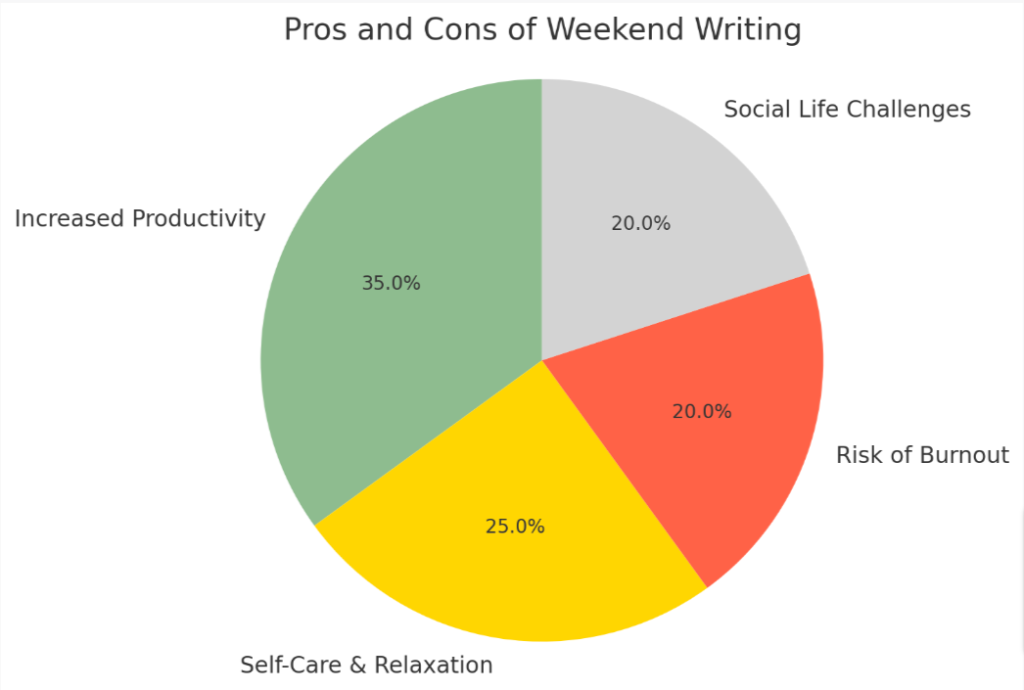The Saturday and Sunday Dilemma: Evaluating Weekend Writing Habits
Does the thought of weekend writing make you cringe or do a happy dance? It’s not unusual – many are torn between using weekends for relaxation or extra productivity. This article sheds light on the effects and strategies of writing during your off days, helping you decide if it’s a yay or nay.
Ready to find out more?.
Key Takeaways
- Weekend writing can increase productivity by providing uninterrupted time and a relaxed mindset for creative thinking.
- Taking breaks and prioritizing self – care during weekend writing sessions can prevent burnout and improve the quality of work produced.
- Joining a structured writing workshop, like the Golden Writing Workshop, can provide support, guidance, and opportunities for growth for those interested in weekend writing.
Pros and Cons of Weekend Writing
Weekend writing has its benefits, such as increased productivity and the opportunity for self-care and relaxation, but it also comes with potential drawbacks like burnout and difficulty maintaining a social life.
Increased productivity
Utilizing weekends for writing can significantly boost productivity. Having full mornings and afternoons free allows you to dedicate large chunks of uninterrupted time to your craft.
The lack of work emails, meetings, and other weekday distractions often results in high-quality output. Furthermore, the relaxed weekend mindset may stimulate creativity and bring forth ideas that would otherwise remain untapped during the hectic weekdays.
This intense focus could even cut down your overall writing time dramatically, allowing you to complete projects ahead of schedule.
Time for self-care and relaxation
Squeezing in time for self-care and relaxation forms a crucial part of any writing routine, especially when it comes to weekend writing. Incorporating activities such as meditation, reading for leisure or simply going for a walk can significantly boost productivity and creativity levels.
These moments of calm let your mind wander freely, often leading to unexpected ideas and connections which are beneficial to the writing process.
Adopting good habits like maintaining physical fitness also brings about improved focus and mental clarity. A refreshing morning run before starting the weekend writing spree or quick workout breaks interspersed throughout the day may prove helpful in rejuvenating both your body and mind.
Proper sleep is equally important – ensuring optimal sleep hours helps ward off fatigue, enabling you to maintain high energy levels that keep writer’s block at bay.
Potential for burnout
Prolonged periods of writing can lead to burnout, reducing productivity and creativity. It is a state of mental exhaustion that comes from constant stress or pressure often linked with weekend writing sprees.
You might be in danger of losing interest in your hobby, feeling frustrated or unproductive.
Moreover, spending every spare moment glued to the keyboard may cause physical discomforts such as eye strain or back problems. The body needs time for physical fitness and rest too.
Even if that riveting plot twist or perfect rhyme is keeping you awake at night, you have to learn when it’s time to put down the pen (or close your laptop) and take a break.

Difficulty maintaining a social life
Maintaining a social life can be challenging for avid weekend writers. With limited free time, it’s easy to get caught up in writing projects and neglect social connections. Friends may feel neglected or forgotten as writing takes precedence.
Balancing a busy writing schedule with maintaining friendships and relationships requires effort and planning. Making time specifically for social activities, setting boundaries around writing time, and communicating openly with loved ones can help ensure a healthy balance between creative pursuits and personal connections.
Tips for Successfully Writing on Weekends
Set clear boundaries and create a schedule for your writing time. Prioritize tasks and remember to take breaks for self-care. Want more tips on how to make the most of your weekend writing sessions? Keep reading!
Setting clear boundaries and schedule
To successfully write on weekends, it’s important to set clear boundaries and establish a schedule. This means carving out dedicated time for writing and creating structure around when you will be working.
By setting specific hours or blocks of time for writing, you can create a sense of routine and make it easier to stay focused and productive. It also helps to communicate these boundaries with others, letting them know that during your designated writing time, you won’t be available for socializing or other activities.
Creating this balance between writing and the rest of your life can lead to increased productivity and a greater ability to relax during non-writing times.
In addition to setting clear boundaries around when you’ll write, having a schedule can help ensure you make the most of your writing sessions. Prioritizing tasks based on importance allows you to tackle the most essential items first while leaving space in your schedule for breaks or self-care activities.
Prioritizing tasks
To successfully write on weekends, prioritizing tasks is key. Make a list of the most important writing tasks you want to accomplish and rank them in order of importance. This will help you stay focused and ensure that you complete the most crucial tasks first.
By prioritizing your workload, you can make the most of your weekend writing time and maximize your productivity. So, take a few minutes to plan out your writing goals and tackle them one by one – you’ll be amazed at what you can achieve!
Taking breaks and self-care
Taking breaks and prioritizing self-care are essential for successful weekend writing. It’s important to remember that productivity isn’t solely measured by the amount of time spent on tasks, but also by the quality of work produced.
By taking regular breaks, you can recharge your mind and prevent burnout, which ultimately leads to more creativity and focus when you return to writing. Self-care activities like exercise, meditation, or spending time with loved ones can also provide inspiration and a fresh perspective on your writing topics.
So don’t underestimate the power of stepping away from your desk and engaging in activities that nourish both your body and mind.
The Golden Writing Workshop: A Solution for Weekend Writing
Joining the Golden Writing Workshop can provide structure and support for those who want to engage in weekend writing.
Benefits of structured writing practice
Structured writing practice offers several benefits for aspiring writers. Firstly, it provides a clear framework and routine for honing one’s writing skills. By participating in a structured workshop, writers can receive guidance from experienced instructors and learn techniques to improve their craft.
Additionally, the regularity of these sessions helps build discipline and consistency in writing habits. Structured practice also fosters creativity by introducing different prompts and topics that challenge writers to explore new ideas and perspectives.
Overall, engaging in a structured writing practice can lead to enhanced productivity, improved writing skills, and personal growth as a writer.
How to join the workshop
To join the Golden Writing Workshop, follow these steps:
- Visit the workshop’s website or social media pages.
- Fill out the registration form with your details.
- Choose a suitable class period that fits your schedule.
- Pay the registration fee online.
- Attend the workshop sessions either in – person or virtually.
- Participate actively and engage with other writers in the workshop.
- Follow the guidance and instructions provided by the instructor.
- Practice writing regularly and complete any assigned tasks or exercises.
- Seek feedback from the instructor and fellow participants to improve your writing skills.
- Enjoy the benefits of structured writing practice and grow as a writer.

Conclusion: Finding What Works Best for You
In the end, whether weekend writing is a “yay” or “nay” really depends on finding what works best for you. It’s important to balance productivity and relaxation, set clear boundaries and prioritize tasks, and maybe even consider joining a structured writing workshop.
Everyone’s writing habits and preferences are different, so find what fits your schedule and helps you achieve your writing goals.

